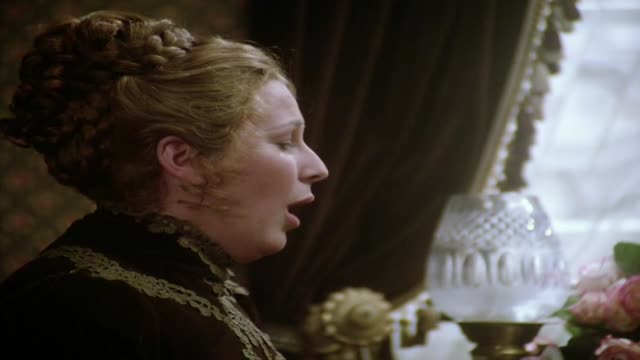Despite having studied at the Nuremberg Conservatory, Martha Mödl spent her early working years as a book-keeper and secretary in a large business organization; it is possible that her late debut as a singer may have enabled her to conserve her vocal powers for longer than usual. Her first operatic appearance was as Hänsel / Hänsel und Gretel at Remscheid in 1942: the same year, and place, of her Azucena / Il trovatore, Cherubino / Le nozze di Figaro and the title role in Mignon, indicating that her early vocal placement was open to question. Mödl’s career then suffered a temporary halt when she was conscripted to work in a munitions factory.
Between 1945 and 1949 Mödl was a member of the Düsseldorf Opera, where she initially sang such roles as Octavian / Der Rosenkavalier, Dorabella / Così fan tutte and the Composer / Ariadne auf Naxos before moving on to heavier parts such as Eboli / Don Carlo and Lady Macbeth / Macbeth. In 1947 she also sang Marie / Wozzeck, the first in a distinguished line of interpretations of numerous twentieth-century operas; and the following year she made her debut at the Vienna State Opera, where she was to sing frequently, as Octavian. In 1949 (the year she joined the Hamburg State Opera) Mödl appeared at the Royal Opera House, London in the title role of Carmen, learning the part in English; while her Kundry / Parsifal in Berlin that same year won high praise.
It was as Kundry also that Mödl first appeared at La Scala, Milan in 1950; and her performance at Hamburg in the same role was seen by Wieland Wagner, who invited her to sing this part at the reopening of the Bayreuth Festival in 1951. With her slender figure, immense and expressive eyes, and gift for powerful stillness, she proved to be an ideal exponent of Wieland’s ideas for the concentrated stagings of ‘the new Bayreuth’. Mödl was to sing at Bayreuth, in a variety of roles, until 1967. In addition to her Kundry (1951–57 and 1959–1960), her Isolde / Tristan und Isolde of 1952 with Karajan conducting was especially notable (also in 1953 and 1962). She is one of the very few sopranos to have appeared at the Festival in all three female leads in Die Walküre, having sung Brünnhilde (1953–1956), Sieglinde (1954–1955) and, finally, Fricka (1967).
A singer greatly admired by Wilhelm Furtwängler, Mödl recorded with him a complete Ring cycle for Italian radio in 1953 and, for EMI, Leonora / Fidelio and Die Walküre (the latter completed shortly before Furtwängler’s death in 1954). In 1955 she sang Leonore in the historic Fidelio that opened the restored Vienna State Opera, which she later described as ‘one of the most memorable moments of my life’.
Having joined the Stuttgart Opera in 1953, Mödl made her debut at the Metropolitan Opera, New York in 1957 as Brünnhilde / Siegfried, followed by the same role in both Götterdämmerung and Die Walküre. She returned in 1958 to sing Isolde and Kundry, while her final appearances at the Met came in 1960 as the Die Walküre / Brünnhilde and Kundry in 1960. Of these Musical America wrote: ‘Miss Mödl is a shining example of an artist whose dramatic and musical intelligence triumphs over fundamental vocal weaknesses, making us forgive them through the sheer magnetism of her performances.’
Mödl returned to London in 1959 for the Konwitschny Ring cycle, but by then her voice was beginning to fray at the top and she began to turn once more to the mezzo repertoire during the early 1960s. At the opening of the rebuilt National Theatre in Munich in 1963 she appeared as the Nurse / Die Frau ohne Schatten and at Covent Garden in 1965 sang a blood-curdling Klytaemnestra / Elektra (a role she also sang at the Salzburg Festival in 1964 and 1965).
As well as singing character parts in the mezzo repertoire in operas such as Aufstieg und Fall der Stadt Mahagonny (Cologne, 1970), Die schweigsame Frau (Munich, 1971), The Queen of Spades (Nice, 1989; Mannheim, 1999), Mödl also appeared in a succession of significant performances of contemporary operas. These included Britten’s Gloriana (Münster, 1968), Blacher’s 200,000 Taler (Berlin, 1969), Reimann’s Melusine (Schwetzingen Festival, 1971), Fortner’s Elisabeth Tudor (Berlin, 1972), von Einem’s Kabale und Liebe (Vienna, 1976), Reimann’s Die Gespenstersonate (Berlin, 1984), Hiller’s Der Rattenfänger, ein Hamelner Totentanz (Dortmund, 1993) and Klebe’s Gervaise Macquart (Düsseldorf, 1995).
It is an indication of the great esteem in which Mödl was held during her lifetime that she was appointed a Kammersängerin in Vienna, Berlin, Munich and Stuttgart. Her performances were characterized by great dramatic intensity, allied to an extraordinary level of stagecraft. She devoted her life to her very considerable art, but was modest about her achievements. ‘I never had the talent to be a diva,’ she said in an interview, ‘but I just like to sing and act so much.’
© Naxos Rights International Ltd. — David Patmore (A–Z of Singers, Naxos 8.558097-100).
| Title | |
| STRAUSS, R.: Arabella (Solti) (1977) | |

|
STRAUSS, R.: Arabella (Solti) (1977)
Composer:
Strauss, Richard
Artists:
Fransson, Goran -- Ghazarian, Sona -- Gruberova, Edita -- Helm, Hans -- Janowitz, Gundula -- Kollo, Rene -- Kraemmer, Hans -- Lilowa, Margarita -- Modl, Martha -- Rydl, Kurt -- Solti, Georg -- Vienna Philharmonic Orchestra -- Weikl, Bernd
Label/Producer: UNITEL |
| WAGNER, R.: Rheingold (Das) (1978) | |

|
WAGNER, R.: Rheingold (Das) (1978)
Composer:
Wagner, Richard
Artists:
Altmeyer, Jeannine -- Berlin Philharmonic Orchestra -- Esser, Hermin -- Fassbaender, Brigitte -- Finnila, Birgit -- Hendrikx, Louis -- Kanel, Vladimir de -- Karajan, Herbert von -- Kelemen, Zoltan -- Modl, Martha -- Moser, Edda -- Nienstedt, Gerd -- Randova, Eva -- Rebmann, Liselotte -- Ridderbusch, Karl -- Roar, Leif -- Schreier, Peter -- Stewart, Thomas -- Stolze, Gerhard
Label/Producer: UNITEL |
